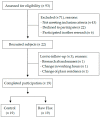Acute Flaxseed Intake Reduces Postprandial Glycemia in Subjects with Type 2 Diabetes: A Randomized Crossover Clinical Trial
- PMID: 36145115
- PMCID: PMC9503020
- DOI: 10.3390/nu14183736
Acute Flaxseed Intake Reduces Postprandial Glycemia in Subjects with Type 2 Diabetes: A Randomized Crossover Clinical Trial
Abstract
Background: Postprandial glycemic excursions are associated with impairment control of diabetes mellitus. Long-term consumption of flaxseed can lower blood glucose levels; however, its effects on the postprandial glycemic response remain unknown. Therefore, this study aimed to evaluate the acute effects of raw flaxseed consumption on the 2 h postprandial glycemic curve in men with type 2 diabetes mellitus (T2DM). Methods: This was a randomized crossover clinical trial. Nineteen men with T2DM were randomly assigned a standardized breakfast without (control) or with a previous intake of 15 g of ground raw golden flaxseed (flax). Glycemia was measured at fasting and postprandial at 15, 30, 45, 60, 90, and 120 min. Palatability markers (visual appeal, smell, and pleasantness of taste) and taste intensity (sweetness, saltiness, bitterness, sourness, and creaminess) were evaluated. Results: The peak glucose rise and the 2 h AUC glycemic response reduced in the flax group by 17% (p = 0.001) and 24% (p < 0.001), respectively. The glucose peak time, palatability, and taste parameters did not differ between the two groups. Conclusions: Ingestion of 15 g of ground raw golden flaxseed before breakfast decreases the 2 h postprandial glycemic response in men with T2DM.
Keywords: complex carbohydrates; diabetes mellitus; dietary fiber; flaxseed; postprandial blood glucose.
Conflict of interest statement
The authors declare no conflict of interest.
Figures


Similar articles
-
Suppression of the postprandial hyperglycemia in patients with type 2 diabetes by a raw medicinal herb powder is weakened when consumed in ordinary hard gelatin capsules: A randomized crossover clinical trial.PLoS One. 2024 Oct 9;19(10):e0311501. doi: 10.1371/journal.pone.0311501. eCollection 2024. PLoS One. 2024. PMID: 39383145 Free PMC article. Clinical Trial.
-
Effects of soy-soluble fiber and flaxseed gum on the glycemic and insulinemic responses to glucose solutions and dairy products in healthy adult males.J Am Coll Nutr. 2013;32(2):98-110. doi: 10.1080/07315724.2013.767579. J Am Coll Nutr. 2013. PMID: 24015717 Clinical Trial.
-
Addition of pooled pumpkin seed to mixed meals reduced postprandial glycemia: a randomized placebo-controlled clinical trial.Nutr Res. 2018 Apr 26;56:90-97. doi: 10.1016/j.nutres.2018.04.015. Nutr Res. 2018. PMID: 30055778 Clinical Trial.
-
Effect of flaxseed (Linum usitatissimum) supplementation on glycemic control and insulin resistance in prediabetes and type 2 diabetes: A systematic review and meta-analysis of randomized controlled trials.Complement Ther Med. 2022 Nov;70:102852. doi: 10.1016/j.ctim.2022.102852. Epub 2022 Jul 14. Complement Ther Med. 2022. PMID: 35843472 Review.
-
Flaxseed supplementation significantly reduces hemoglobin A1c in patients with type 2 diabetes mellitus: A systematic review and meta-analysis.Nutr Res. 2023 Feb;110:23-32. doi: 10.1016/j.nutres.2022.12.008. Epub 2022 Dec 27. Nutr Res. 2023. PMID: 36640581 Review.
Cited by
-
Beneficial Effects of Dietary Flaxseed Oil through Inflammation Pathways and Gut Microbiota in Streptozotocin-Induced Diabetic Mice.Foods. 2023 Aug 28;12(17):3229. doi: 10.3390/foods12173229. Foods. 2023. PMID: 37685162 Free PMC article.
-
Tracing the pathways and mechanisms involved in medicinal uses of flaxseed with computational methods and bioinformatics tools.Front Chem. 2024 Jan 12;11:1276052. doi: 10.3389/fchem.2023.1276052. eCollection 2023. Front Chem. 2024. PMID: 38283897 Free PMC article.
-
Suppression of the postprandial hyperglycemia in patients with type 2 diabetes by a raw medicinal herb powder is weakened when consumed in ordinary hard gelatin capsules: A randomized crossover clinical trial.PLoS One. 2024 Oct 9;19(10):e0311501. doi: 10.1371/journal.pone.0311501. eCollection 2024. PLoS One. 2024. PMID: 39383145 Free PMC article. Clinical Trial.
References
-
- Esposito K., Ciotola M., Carleo D., Schisano B., Sardelli L., Di Tommaso D., Misso L., Saccomanno F., Ceriello A., Giugliano D. Post-Meal Glucose Peaks at Home Associate with Carotid Intima-Media Thickness in Type 2 Diabetes. J. Clin. Endocrinol. Metab. 2008;93:1345–1350. doi: 10.1210/jc.2007-2000. - DOI - PubMed
Publication types
MeSH terms
Substances
Grants and funding
LinkOut - more resources
Full Text Sources
Medical

